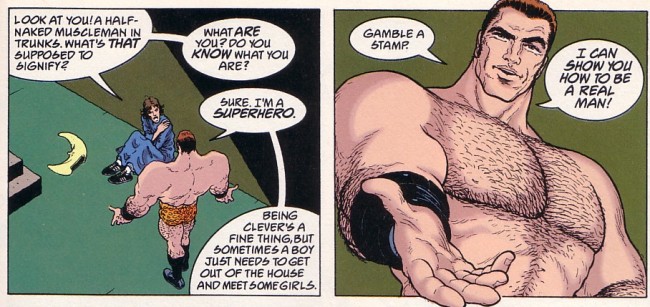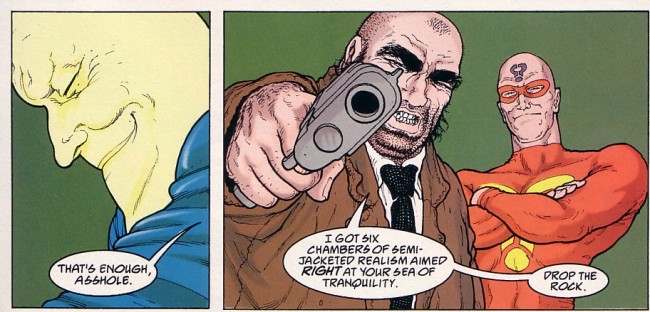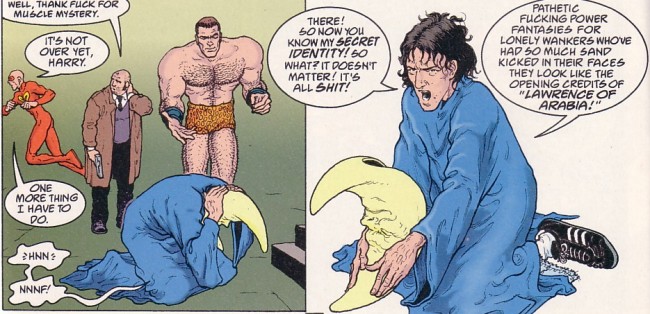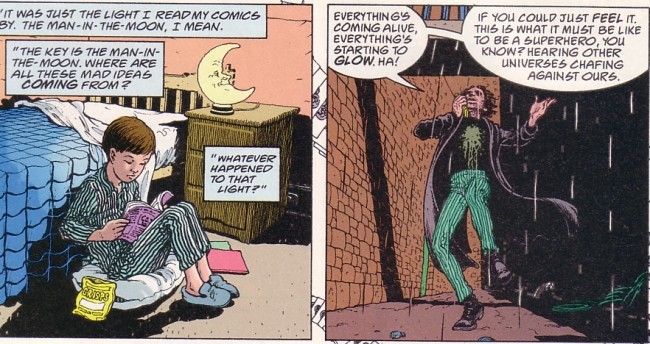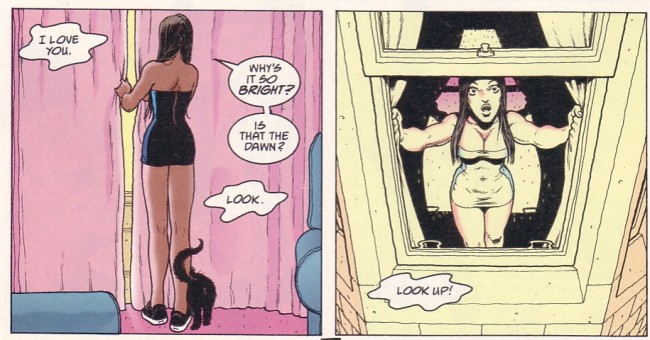I wrote a thing this weekend about some frankly laughable and odious comments Joseph Michael Straczynski made about Alan Moore and Dan Didio made about Before Watchmen on a DC panel at C2E2. I wrote about it because like… it’s obvious, right? They’re actually saying stupid and demonstrably false things in public and expecting us to nod our heads. That’s worth pointing out.
I took a trip around comicsinternet to see who else noticed and remarked on what JMS had to say. Here’s my answer, from an interview between Vaneta Rogers and Brian Azzarello, two people whose work I’ve greatly enjoyed in the past:
Newsarama: Brian, I know this is a little weird. But I’m going to do a Before Watchmen interview without talking about the so-called “controversy,” because I think we’ve covered that pretty well, don’t you?
Brain Azzarello: Yeah, and you know, everyone talked about this controversy, but there really hasn’t been much of one. I mean, I don’t read everything that people are saying.
Nrama: Obviously, the project’s moving forward no matter where the discussion goes. So let’s talk about the project instead. And to start, let me admit that I’m one of those people who read Watchmen years after it was published. A newcomer, I suppose.
This is the opening exchange in the interview. And… cool. I guess this is how it’s going to be. Any dissent to Before Watchmen classified as a “so-called scare quotes controversy scare quotes,” doubly negating it (because it isn’t a controversy, you see, and also, it isn’t a controversy), and as a controversy, something that has been hard to notice.
Actually, you know what? I’ll actually give Azzarello that point, that thing about there not really having been much of a controversy. I mean, I read a lot of comics news sites, people shoot me links to ones I don’t read when juicy stuff goes up… and here’s, as near as I can tell, the sum total of the organized dissent (meaning extended posts that are explicitly about the subject, rather than passing jokes/hate/whatever) against Before Watchmen in the comics media:
-Tom Spurgeon’s “Sometimes They Make It Hard To Ignore Creators Issues” and “Twenty-One Not Exactly Original Notes On More Watchmen, Written At A Slight Remove”
-Image Comics publisher Eric Stephenson’s “NO FUN”
-Chris Mautner’s “We’ve come so far: On Before Watchmen and creators rights”
-Rich Johnston’s “The Ethics Of Before Watchmen”
-Mindless Ones’ “‘The Second Coming of Night Owl’, and other stories…”
-Tom Bondurant’s “Grumpy Old Fan | Set your clocks back”
Newsarama’s top dawg editor Lucas Siegel is on record as preferring to use Alan Moore’s great big British wizard tears instead of alcohol when he needs to get tore up, so the lack of dissent there is understandable. But unless I missed something major, even CBR proper (Robot6 being a subordinate but separate blog), The Beat, and my beloved sometime employer ComicsAlliance are thus far mum on the issue as far as dissent goes, but have still posted all the promo images, making for de facto approval.
There’s been a real failure of the comics press to address Before Watchmen from any angle but that of a hype man. Sure, some of us have tweeted about it, but where are the essays? We all know it’s going to sell gangbusters, but that’s no reason to avoid facing the issue head on.
So, in the interest of turning phrases like the “so-called ‘controversy'” into something that’s actually worth discussing like adults, here. Here’s (an abbreviated version of) my argument against Before Watchmen, which is shared in some form or another by many other comics readers and creators I know. The specifics may differ, but that’s on them. Here’s where I’m coming from. Your mileage may vary, but after this, you don’t get to deny a single solitary thing.
The Facts
1. Alan Moore and Dave Gibbons’s
Watchmen is an enormously successful comic book, on creative, critical, and commercial levels
2. Moore and Gibbons both signed a contract that gave DC the rights to
Watchmen until the book went out of print for a year (I believe), at which point they’d receive the rights back
3.
Watchmen was an unheralded success, and the book has yet to go out of print. As a result, Moore and Gibbons never got their rights back.
4. DC promised to share revenue from
Watchmen-related merchandise, and then went ahead and produced merchandise and classified it as promotional and didn’t give M&G anything
5. These shenanigans, along with a coming ratings system that Moore disagreed with, led Moore to cut ties with DC entirely
6. DC brought Wildstorm, which came along with America’s Best Comics. Moore felt that leaving DC again would screw his artists over, so he stuck around
7. DC continued screwing with Moore over the years, from pulping his comics to either sabotaging (or botching to such an extent that it might as well be sabotage) the release of
League of Extraordinary Gentlemen: Black Dossier
8. Moore cut ties again, and has consistently refused DC’s money, overtures, and renegotiations.
9. Before Watchmen is a series of prequels to
Watchmen, some thirty-five issues that will shed light on characters from the book
10. Alan Moore gives grumpy, hyperbolic interviews, but his basic point is that he’d prefer it not happen (and not because he wants money [he doesn’t, by his own word] but because it’s shameless and ugly).
11. For all his faults, Paul Levitz refused to let Before Watchmen happen on his watch. As soon as he left, it was on.
12. Before Watchmen has an economic motivation, not an artistic one. No one said “Boy, I have this great Nite Owl story.” Dan Didio said, “Hey, we need to make more money, and
Watchmen is just sitting there. Who do we have who wants to sign on for fat cash?”
I think we can all agree on all of this? If you don’t agree, sorry bro. Open whatever history book they hide comics history in. I’m no scholar and even I know all of this is on the record as being true and consistent, barring the quotes, which I’m sure are true in spirit.
There are a few things that people, mainly DC staff and Joseph Michael Straczynski, like to bring up with scabrous intensity and frequency.
Not The Issue
1. The comics aren’t going to be good as the original! (Who cares? It’s not about quality, and maybe they’ll be enjoyable on their own.)
2. The creators involved suck! (Yeah, Darwyn Cooke, Brian Azzarello, Amanda Conner, and Jae Lee are b-list now? Get real. They do great work. I can give you a list. I’ll grant you JMS and Len Wein, though.)
3. Alan Moore copies peoples characters, too! (It’s not about working on someone else’s properties, and this is a false equivalency, anyway. Moore isn’t writing
Dracula 2 or
Before Moby Dick. He’s using public domain characters — meaning characters whose creators enjoyed the fruits of their labor before dying and the characters passing into public domain, not characters who were effectively stolen by way of shady contracts and lawyering — in new ways. When he does use non-PD characters, it’s never by name. If you don’t know who they are, you won’t know who they are. That’s demonstrably different than some dude writing
Nite Owl: What Happened Before.)
4. Alan Moore is just greedy! (If he was greedy, he’d have taken a quarter million dollar [or however much] payout when DC offered it.)
5. Alan Moore is arrogant and sitting on the moral high ground. (“Please stop screwing me” is the opposite of arrogance and the moral high ground.)
These are false arguments. People might have said them in passing, or as part of a larger argument, but they aren’t the meat of why so many people have problems with Before Watchmen. These are strawmen that DC has propped up to be shot down, so as to murder any dissent in its crib. Last weekend, DC brought out a “mildly skeptical fan” (read: paid plant, shill, scrub, faker, liar, fool) who expressed concern. They showed him some art on the panel and WHOA! They beat the skeptic! Everybody, they beat the skeptic! They win! Before Watchmen is a good idea now!
That’s how strawmen work. You beat them up for a cheap victory in front of the rubes. The rubes, in this case, being whoever it is you think isn’t quite convinced by your press rollout just yet. Alongside these strawmen, DC staff, Dan Didio especially, has been crowing about how opposition has been minimal. How everyone who had concerns was soon convinced otherwise. He never names names. Who was concerned? Who was convinced? Where are these paragons of virtue, that they might deliver unto us wisdom?
The Controversy
Here’s the controversy, put as plainly as I can muster right now. You might have pedantic issues with specifics of this due to my phrasing, but suck it up. We’re all adults here. You know what i’m saying.
“The problem with Before Watchmen is that DC Comics cheated Alan Moore and Dave Gibbons out of the rights to Watchmen. Gibbons is fine with this, as is his right to be, and Moore is upset, as is also his right. Before Watchmen, therefore, is exploiting characters gained through the same shady means that have punctuated the comics industry over the years. The comics industry has screwed over dozens of creators, and Before Watchmen is just another screwjob. The broadsides against Alan Moore from JMS are disgusting, and Dan Didio’s dog and pony show to ameliorate doubts are laughably see-thru.”
Get it? We all feel strongly about creators’ rights. At least, I hope so. This is, at its most basic level, a creators’ rights issue. It’s about respecting creators, their work, and the product of that work.
I had a conversation with a pro creator at Emerald City Comicon. He explained the Before Watchmen situation like this: Alan Moore is one of the most respected writers in comics. He has co-created, revamped, or introduced tons of things that have enriched both the medium and the artform. His books are routinely some of the best-crafted works around, even if they’re not to your or my tastes, and he’s one of the few writers in the running for GOAT. But when he says, “Hey, listen. Please don’t do more Watchmen. I’ve been mistreated by DC, and I think the book stands very well on its own besides,” the response from DC and the creative teams involved is essentially, “No, fuck you, Alan.”
I don’t know how to feel about a lot of creators I respect and like working on these books. On the one hand, do what you gotta do to feed your family. But on the other… isn’t there some better way to go about doing that? I’m conflicted. But this is an ugly situation.
I don’t know how to put it any plainer. DC Comics is screwing Alan Moore right here in front of us, and the best Newsarama has to offer is that it’s a “so-called ‘controversy'”? One, it is a controversy, and two, you don’t just not talk about the controversy because the books are going to come out anyway. What kind of fatalist, ridiculous garbage is that? I mean, gosh, you don’t tell somebody with cancer, “Look, we both know you got some cancers up in there, so why don’t we talk about the weather, instead?”
And no. You don’t do that. You talk about the cancer, you treat the cancer, you tear it out and stamp on it until it’s gone. Until it’s a memory of a time when Marvel could tell Jack Kirby to give up any rights he was owed, when Marvel could promise Frank Miller that Elektra was going to stay dead and then bring her back anyway, when Ditko disappeared from mainstream comics, when Moore & Gibbons were cheated out of what they’re owed, and when editors used creators like chess pieces because they were eager to get the books out on time, instead of like people who they thought could do a great job.
It’s 2012. A lot of things have changed since Siegel & Shuster got their raw deal. But not enough has changed, clearly, if we’re still having this same old stupid conversation.
“Should comics companies get to screw over creators? Sure, as long as I get my tights and fights on time.” Okay then. If that’s your position, fine. I don’t think you have to agree with me. But to pretend like there isn’t any real opposition to this, from both fans and peers, makes you a liar, so you should maybe keep that in mind when talking about this. And if they don’t want to answer your questions, you ask them why they don’t want to answer your questions. Why why why. Make them go on the record.
“DC Comics screwed, and is screwing, Alan Moore.”
That’s the controversy. Now let’s talk it out instead of pretending like it doesn’t exist.












